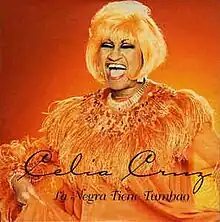| "La Negra Tiene Tumbao" | ||||
|---|---|---|---|---|
 | ||||
| Single by Celia Cruz featuring Mikey Perfecto | ||||
| from the album La Negra Tiene Tumbao | ||||
| Released | 2001 | |||
| Genre | Salsa, reggaeton | |||
| Length | 4:15 | |||
| Label | Sony Discos | |||
| Songwriter(s) | Sergio George, Fernando Osorio | |||
| Producer(s) | Sergio George | |||
| Celia Cruz singles chronology | ||||
| ||||
"La Negra Tiene Tumbao" (English: "The Black Woman's Got Rhythm") is a song performed by Cuban recording artist Celia Cruz. It features rap vocals performed by Mikey Perfecto. The song was written by Sergio George and Fernando Osorio, produced by George and released as the lead single from Cruz's fifty-ninth studio album La Negra Tiene Tumbao (2001).
The song peaked at number thirty on the Billboard Latin Songs chart and number four on the Billboard Tropical Songs chart. It also managed to peak at number thirteen on the Tropical Digital Songs chart in 2015. It received nominations for Record of the Year, Song of the Year, and Music Video of the Year at the Latin Grammy Awards of 2002.
Recording and production
Producer Sergio George was hired to produce more traditional tracks for the album. However, George wanted to try something different. According to George, he played a demo version of "La Negra Tiene Tumbao" for Cruz, "not knowing how she would respond, and that was the song that she most reacted to". It was the last song completed for the album.[1]
Musical composition
"La Negra Tiene Tumbao" combines elements of salsa music, reggae music and hip hop music.[2] The song's title translates to "The Black Woman has Style" or "The Black Woman has grace".[3] The song was composed in minor key and incorporates the use of vocal call and response.[4]
Critical reception
In Allmusic's Sharon Witmer review of the parent album, the song was selected as at the "CD's biggest draw".[5] According to Billboard magazine's Leila Cobo, the song, "with its mid-section rap became the blueprint—to this day—for a bust of recordings featuring much younger acts."[6] The song has been considered one of Cruz's last hits before her death in July 2003.[7][8]
The song received nominations for Record of the Year, Song of the Year, and Music Video of the Year at the Latin Grammy Awards of 2002.[9][10] The parent album won the Latin Grammy Award for Best Salsa Album.[11] It was nominated for Album of the Year.[9] The song was also nominated Tropical Song of the Year at the 2003 Lo Nuestro Awards, eventually losing to Cruz's own "La Vida Es Un Carnaval".[12] It received a nomination for Best "Party Starter" at the 2004 Premios Juventud. "La Vida Es Un Carnaval" was also nominated in the same category.[13] In 2016, the song was awarded Television Theme Song of the Year, for the television program Celia, at the American Society of Composers, Authors and Publishers Awards.[14]
Charts
Weekly charts
|
Year-end charts
|
References
- ↑ Cobo, Leila (7 December 2002). "Latin Notas: Still Cruzin". Billboard. Prometheus Global Media. Retrieved 16 January 2017.
- ↑ Mendible, Myra (3 June 2010). From Bananas to Buttocks: The Latina Body in Popular Film and Culture. University of Texas Press. p. 97. ISBN 9780292778498. Retrieved 16 January 2017.
- ↑ Gardner, Abigail (16 March 2016). Rock On": Women, Ageing, and Popular Music. Routledge. p. 61. ISBN 9781317189107. Retrieved 16 January 2017.
- ↑ "La Negra Tiene Tumbao - Celia Cruz on Pandora Internet Radio". Pandora Radio. Pandora Media, Inc. Archived from the original on 18 January 2017. Retrieved 16 January 2017.
- ↑ "La Negra Tiene Tumbao - Celia Cruz: Songs, Reviews, Credits: Allmusic". Allmusic. Rovi Corporation. Retrieved 14 January 2017.
- ↑ Cobo, Leila (2 August 2003). "Remembering Celia Cruz Latin's Tireless Advocate". Billboard. Prometheus Global Media. Retrieved 15 July 2016.
- ↑ Hertz, Erich (2014). Write in Tune: Contemporary Music in Fiction. Bloomsbury Publishing, USA. p. 185. ISBN 9781623564223.
- ↑ Gardner, Abigail (2016). 'Rock On': Women, Ageing and Popular Music. Routledge. p. 61. ISBN 9781317189107.
- 1 2 "Selected Nominees For The Third Latin Grammy Awards". AllBusiness.com. 3 August 2002. Retrieved 17 June 2016.
- ↑ Susman, Gary (24 July 2002). "Trophy Time". Entertainment Weekly. Time Inc. Archived from the original on 27 July 2014. Retrieved 17 June 2016.
- ↑ "3rd Annual Latin Grammy Awards – Winners". Latin Grammy Awards. Latin Academy of Recording Arts & Sciences. 18 September 2002. Archived from the original on 1 December 2002. Retrieved 17 June 2016.
- ↑ "Thalia, Alejandro Sanz, Paulina Rubio, Enrique Iglesias, Lupillo Rivera, Carlos Vives, Celia Cruz, Juanes and a Host of Hispanic Artists Compete for the Latin Music Awards, Premio Lo Nuestro". Univision. Business Wire. November 19, 2002. Archived from the original on October 13, 2013. Retrieved September 27, 2013.
- ↑ "Así fue la primera alfombra de Premios Juventud". Univision. Univision Communications Inc. 5 June 2004. Retrieved 22 November 2016.
- ↑ "2016 El Premio ASCAP". ASCAP Latin Awards. American Society of Composers, Authors and Publishers Awards. Retrieved 14 January 2017.
- ↑ "Celia Cruz Chart History (Hot Latin Songs)". Billboard. Retrieved 8 March 2023.
- ↑ "Celia Cruz Chart History (Tropical Airplay)". Billboard. Retrieved 8 March 2023.
- ↑ "Tropical Digital Songs: Oct 31, 2015 − Billboard Chart Archive". Billboard. Prometheus Global Media. 31 October 2015. Retrieved 14 July 2016.
- ↑ "The Year in Music 2002: Tropical/Salsa". Billboard. Prometheus Global Media. 27 December 2003. p. 40. Retrieved 17 June 2016.
celia cruz.